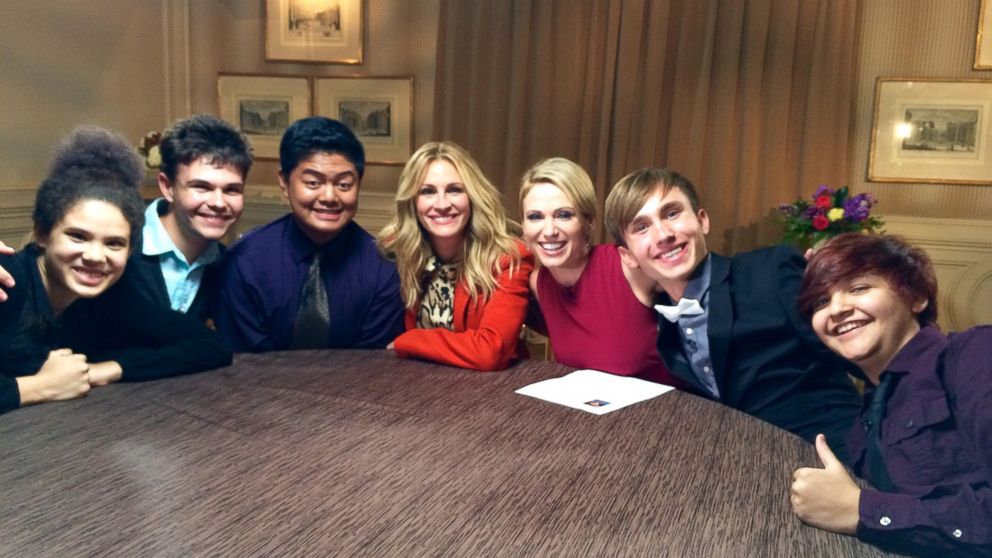Julia Roberts Honored at ‘Pretty Woman’ Hotel for Humanitarian Work
Julia Roberts honored at GLSEN Respect Awards with Humanitarian Award.

— -- Julia Roberts was back at the iconic Regent Beverly Wilshire in Los Angeles Friday night, where she famously filmed “Pretty Woman” 25 years ago.
This time, however, the leading lady wasn’t gracing the hotel to rendezvous with Richard Gere. Instead, she was accepting the Humanitarian Award from GLSEN, an organization that aims to prevent bullying against members of the LGBT community in schools.
“Good Morning America” had the opportunity to sit down with Roberts, 46, before the 2014 GLSEN Respect Awards, along with five young GLSEN ambassadors -- Mark Pino, Emery Vela, Peter Finucane-Terlop, Ben Espejo and Ariana Thornton -- to talk about the bullying issue that so many face these days.
“Why is this such an important issue for you and for your family?," ABC News' Amy Robach asked Roberts.
“I think for my family, because these are the heroes that are leading the way so that my children can go to school really unencumbered by this conversation,” the actress explained of the five ambassadors. “You guys are the trailblazers. The future is really riding on people like this.”
When asked whether Roberts and each ambassador could summarize how bullying has made them feel in one word, they all had poignant yet similar answers.
“I’m going to start with my own experience and say that bullying, when I have been bullied when I was younger, it made me feel insignificant,” Roberts said.
“I would say it has made me feel silenced,” Vela, a high school freshman from Denver, Colorado, who identifies as a straight-trans man, added.
“Dehumanized,” Pino, a high school junior from Linwood, New Jersey, who identifies as gay, recalled.
“I want to say alone,” said Espejo, a high school senior from Buena Park, California, who identifies as gay.
“Devaluating,” Finucane-Terlop, a high school junior from Tampa, Florida, who identifies as gay, agreed.
“I would say ignored,” said Thornton, a high school junior from Midland, Michigan, who identifies as pansexual.
Each of them also had strong opinions about what they would change in their schools to promote acceptance, if given the chance.
“I feel like a majority of the bullying that happens, or any other major issue, mainly occurs from just ignorance,” Vela said. “You know, it’s not people intentionally trying to be discriminatory. It’s just they don’t know.”
“Teachers surprisingly need to be more sensitive with their lessons,” added Pino, pointing out that it’s not just students, but teachers and administration as well, who need to be cognizant of the LGBT community. “I’ve had teachers go on and talk about, ‘Oh guys, this is how you date a girl.’ [But] it doesn’t ever occur to them that there could be LGBT.”
Roberts, as a mother of three, and Robach, as a mother of two, acknowledge their children are growing up in such a different world than that of their generation.
“What are your concerns as a mother?” Robach asked.
“The most disturbing thing to me,” Roberts began, is the “anonymous aspect of it that I think gives this sort of courage to people to be hateful as a sport. It’s become like a game. And it’s not a game. It’s not funny. There’s nothing brave or courageous about anonymously writing unkind things. You want to go back to the times when you had to actually just punch somebody in the face if you had a problem. You know, had to look them in the eye and say your piece, as opposed to hiding in the dark room typing things out. That’s what gives power to so much of this hatred.”
When teaching her children about tolerance, Roberts says she has different versions of this conversation, “But I do always say to them when we part each other, ‘Remember who you are. Be impeccable in every way that you represent our family in the day.’
“Because even to be passive,” she added, “to be a bystander, is to be absolutely as wrong as the person who is standing in the front of the line of cruelty. Even if this isn’t your friend, even if this isn’t your cause, we’re still all human kind. Everybody’s just trying to get through the day the best they can.”
It’s a message the five young ambassadors can relate to, as well as a conversation they won’t soon forget.




